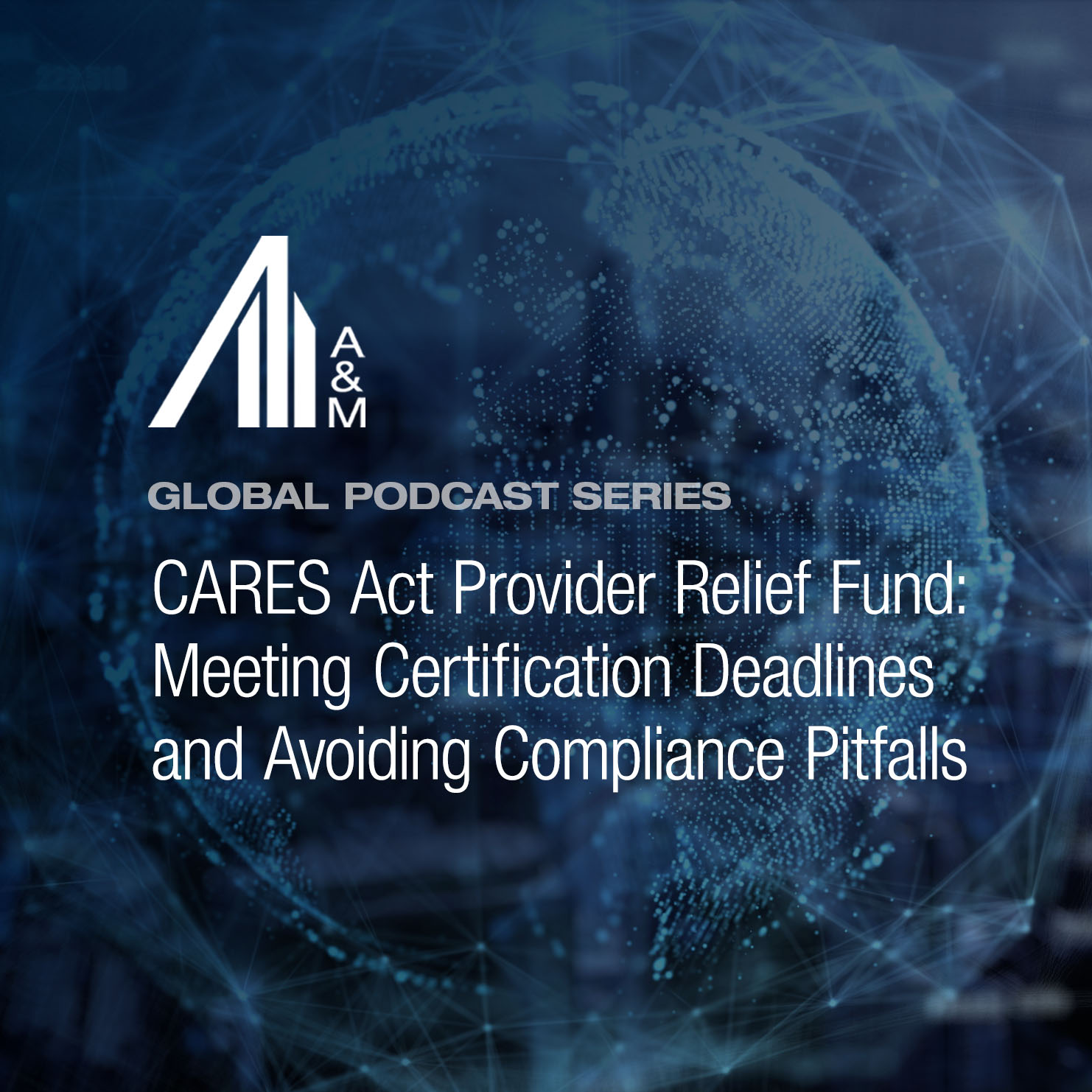Episode Transcript
[00:00:03] Kirk: We've been reading the reports coming out of the HHS-OIG on audits of health plans that are targeting certain diseases, such as acute stroke, acute heart attack, major depression, embolism, vascular claudication, and cancers. Join Ron Vance, and I on the podcast to discuss these topics.
[00:00:23] Speaker 2: Welcome to an A&M Healthcare Industry Group Podcast. Listen as our experts discuss the recent HHS-OIG risk adjustment audits of MAPD plans and the impact on other MAPD health plans and at-risk provider groups.
[00:00:40] Kirk: Hello, and welcome to an A&M Healthcare Industry Group Podcast. I am Kirk Shanks, a Director in Alvarez & Marsal's Healthcare Industry Group. I am joined today by Ron Vance, a Managing Director and Co-Leader of our Health Plan and Managed Care practice. Welcome, Ron.
[00:00:56] Ron: Thanks, Kirk. Nice to be speaking with you today.
[00:00:59] Kirk: Well, always a pleasure. While we're talking about today concerns, the department of health and human services office of inspector general, compliance audits of diagnosis code. That's a mouthful. I'll just refer to them as the HHS-OIG from here on. These audits concern the Medicare Advantage and prescription drug plans which are private health plans that offer Medicare.
First off, this is about risk adjustment. Just a quick refresher course on risk adjustment. Risk adjustment is used in the health industry and particularly Medicare Advantage, but it also in Medicaid and the ACA, but it uses a member's medical history, their diagnoses, and demographic information to assign members a risk score that essentially ranks members based upon their financial risk. Sicker members are riskier. Healthy members are not risky. Medicare Advantage uses risk adjustment to adjust the premiums the plan receives based upon the risk scores of their members.
This is oversimplifying a bit, but if you had a member that had a 1.0 risk score, and you received $800, a health plan received $800 a month in premium for the same plan. If they had another member that was at 0.5, they would get half that, $400. If they had a member that was 1.5, they would get $1,200. You get the picture, and the Medicare Advantage plans are responsible for submitting complete and accurate data to CMS so that CMS will then use to calculate their payment. This is what is being audited.
Over the past couple of years, HHS-OIG has conducted eight or nine compliance audits of MAPD organizations. These audits have been different in a few ways. In the past, HHS-OIG has not really focused on MA organizations. This new scrutiny has caught everyone's attention and also most of these targeted audits are looking at specific conditions and diseases where HHS-OIG thinks there may be a possibility of errors but I believe the main reason this has been brought to the fore is the sheer size of some of the reported overpayments.
One report on that large national health plan from last April estimated a one-year overpayment of almost $200 million. This February, a large regional plan was found to have estimated 54 million one year overpayment.
[00:03:15] Ron: Well, Kirk, that is a really interesting overview and obviously, things are changing here within HHS. I mean, why do you think there's been a shift in focus towards these audits that are targeting health plans? Do you know specifically what years the OIG is looking at?
[00:03:35] Kirk: Most of these audits have been looking back about six, seven years. Of 2014 through 2016 plan years, is what they're looking at mostly. The reason I think they're doing these audits has been, it's because nothing has basically been done. There have been no real oversight in risk adjustment for the health plan. There's been threats of audits in the past, and there's been a few what have been called RADV audits, risk adjustment, data validation audits, but typically these have had no teeth to them, really been no repercussions. Health plans have really just felt free to not worry about it, honestly.
[00:04:11] Ron: Kirk, can you give some additional detail around some of the breaches that OIG has uncovered in their audits?
[00:04:18] Kirk: Well, what the HHS-OIG have been doing in these targeted audits, they have been looking at specific diseases that are missing certain elements, for example, an active stroke that has been documented but does not have an inpatient stay within plus or minus a few months. Major depression, when no antidepressant drug has been prescribed. Cancer without chemotherapy, radiation therapy, or surgical therapy.
The question has been, if somebody had a stroke and didn't go to the hospital, did they really have a stroke? Then I think that's a good question for the OIG to be asking. It turns out that a lot of these errors that they're finding, the ones that are errors, end up being a history of the member had the disease, had the condition in the past, but it's not current and active where it's been documented.
There have also been found more severe manifestations of the disease that have been documented when actually the more minor manifestation of the disease, for example, diabetes with chronic complications has been documented, but there's no evidence in the medical record for the chronic complication and only for the diabetes without a complication.
[00:05:32] Ron: It sounds like Kirk, what you're saying here is that, as we know a lot of health plans have their programs around quality documentation and risk adjustment, I think most would say, well, we're ensuring that there's no inaccurate coding. I mean, people aren't making up diagnoses, but it sounds like what you're saying is that what the OIG is focused on, is really the completeness of the documentation. Is that right?
[00:06:01] Kirk: I would say that's correct. Yes. I don't think any of this has been either suggested by OIG or by anybody else that these are attempts for somebody to trick the government into additional payments. These are just natural errors in documentation where somebody mistakenly records the wrong diagnosis that maybe was correct a year ago, but it should now be a different diagnosis that reports a history of the disease, that is not risk adjustable.
[00:06:28] Ron: That makes sense. Kirk, I've got one more general question before we get into some questions and answers about, well, what do we think people should do about this. What are the current risks that health plans have as they await CMS action?
[00:06:46] Kirk: Well, oh, that's an interesting question. The health plans, I think, as these audits become more widely known, the health actuaries are going to have to start taking this information into account, into their pricing. Also, I believe the major accounting firms, when they're doing their annual financial reports, will also have to be taking this into account because this affects, now we're talking about the 2014, '15, '16 plans years, but going forward, I mean these errors probably still exist and these are not limited, I would suspect to just these plans that have been audited, but maybe more industrywide and these are going to have to be taken into account.
[00:07:27] Ron: Yes. That makes a ton of sense. What's the best course of action for a health plan If they are audited?
[00:07:34] Kirk: Well, remain calm. I would say, main thing is to hire a reputable firm to assist you, and review of the audit, which is essentially an audit of the audit. Make sure that the audit hold CMSs or the HHS-OIG's feet to the fire.
[00:07:52] Ron: It sounds like, get some help and get some advice because this is a path that's, I wouldn't say well-trodden, but other organizations have gone down this path and there are probably some really good lessons learned that a good advisor can help bring into the response, right?
[00:08:12] Kirk: Yes, precisely.
[00:08:14] Ron: There's nothing that a health plan can really do about documentation and coding that's occurred in the past. If they are audited on past data, that is what it is, so to speak. If you think about going forward, Kirk, what are some strategic things that plans should consider doing to mitigate their go-forward risk and exposure?
[00:08:36] Kirk: They should be initiating more internal analytics and quality control to look at these issues. Medicare Advantage health plans are required by regulation to ensure the completeness and the accuracy of their data they're submitting. Historically, they have not been looking at, when they redo chart reviews of a medical record, they have not been looking at the completeness of the record and they typically are only looking for additional or missed diagnosis codes.
They need to be doing more holistic chart reviews that look at the complete record and trying to verify that everything that's being submitted, that should be submitted is actual and current and is being treated. They need to have the internal analytics to support this. You don't want to just start doing chart reviews on every one of your members. You need the analytics to track this, to see that it's working and to be able to target the members for chart reviews and the quality control. I would say, it's in general, they need to increase their budgets for their risk adjustment programs, their provider education, just risk adjustment in general.
[00:09:52] Ron: Those are all great suggestions. Then if I can maybe throw an additional one in there, Kirk, based on what I've seen from top-performing organizations. I think it's also having the right governance around this, for a time and even today, many organizations have their risk adjustment programs embedded fairly deeply within the organization but I think also what I'm starting to see is boards of directors wanting to see some level of reporting on this and certainly, the executive management team's C level needing to have some regular insight into accuracy and completeness of the documentation. Would you agree with that?
[00:10:35] Kirk: Completely. Yes, exactly.
[00:10:38] Ron: Let's shift gears here. Final question, shifting more to the provider side of the equation so as we know, increasingly over the last 5 to 10 years, provider groups have been taking risk. What's the impact to at-risk provider groups that are contracted with an MAPD plan?
[00:10:59] Kirk: That's a good question. I think a little bit unknown, but theoretically, these costs could be passed on to the providers. Imagine if you're a provider group, say in Florida and you're contracted with a large health plan, and I'd say just for round numbers, let's say you got 10% of their membership and they get audited and they're shown to owe $50 million. Do you owe 10% of that? Do you owe $5 million? Can you prove to them that the problem was not you, it was the other 90% of their membership and not your members?
If you're a provider group, and particularly if you're an at-risk provider group, you need to have many of these same mitigation efforts in place that we were talking about for the health plans.
You need to have the analytics, you need to have the provider education, the holistic chart reviews, all of that to protect yourself. Meanwhile, you also need to be looking at your contracts that you're doing going forward with the health plans, making sure you're signing contracts with health plans that are taking this issue seriously, and making sure you're protected in your contracts.
[00:12:06] Ron: Lots for providers to be thinking about as it relates to this topic as well.
[00:12:14] Kirk: Yes.
[00:12:15] Ron: Great. Listen, Kirk, thanks for spending some time and sharing some of your insights and knowledge on this topic. I really do appreciate it and for those who are listening to the podcast, thank you for joining us for this conversation, and for more information, you can go to www.alvarezandmarsal.com.


